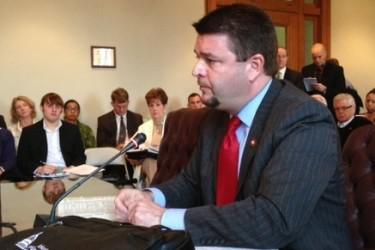In a move that’s stunning even in our era of Republicans spending their every waking hour obsessing over the control of American uteruses, the Arkansas legislature overruled Gov. Mike Beebe’s veto of a blatantly unconstitutional ban on abortions after 12 weeks. This is the earliest ban on abortion passed in the nation. Bans on abortions after 20 weeks have been gaining ground, but attempts to ban abortions earlier in pregnancy have collapsed in the face of public opposition. Now Arkansas is set to be the state that challenges Roe v. Wade, which requires that abortion be unrestricted before the fetus is viable, potentially opening the door to major abortion bans across the nation.
One reason that anti-choice legislators likely went with a ban at 12 weeks is that it’s an easier sell to the public than more aggressive bans. Eighty-eight percent of abortions are performed in the first 12 weeks of pregnancy, making it easy to lull the public into thinking this is no big deal. It’s simple enough for moderates to convince themselves that women who have abortions later in their pregnancies do so because they’re fickle, foolish, or lazy. (Research shows that people’s support for abortion restrictions is more impacted by disapproval of a woman’s choices—for instance, banning abortion for women who simply don’t want to marry their boyfriends is popular—than by concerns about how well-prepared a woman is to raise the baby after it’s born.)
The research, however, demonstrates that women who wait to have abortions usually have entirely sympathetic reasons for their delays. The anti-choice movement bears a lot of responsibility for the prevalence of second trimester abortions. A study of second trimester abortion patients published in Contraception in 2010 found that these patients often had to travel farther to get the procedure and struggled to pay for it. A Guttmacher study from 2005 showed similar results, with 59 percent of these patients saying that they had trouble making the arrangements. The state of Arkansas goes out of its way to make all these obstacles worse. Arkansas has a mandatory lecture and then waiting period, restrictions on insurance coverage, parental notification laws, and a gag rule on state-funded clinics so they can’t help women find abortion providers. In other words, they make it hard for women to get abortions in a timely manner, and then they turn around and ban abortions for the women they’ve forced to wait.
Another major factor in why women wait for abortion is that they’re very young. Nearly one-third of post-12 week abortions are for teenagers, who often don’t understand the symptoms of pregnancy or how their bodies work, problems that are made worse by Arkansas’ hostility toward comprehensive sex education. Being in denial or fear of parents causes delays, and of course, Arkansas’ parental notification law makes the latter problem worse.
All of which means that Arkansas passed an abortion ban that disproportionately targets poor women, mothers who struggle to arrange childcare, and teenagers—while leaving abortion accessible for more privileged women, such as the women who support these conservative legislators with their money and their votes.
